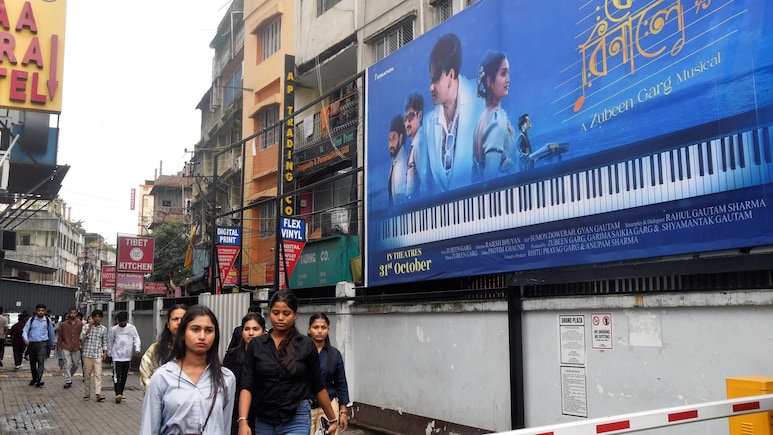
When the first show of 'Roi Roi Binale' began at 4:25 am in Guwahati on Friday, queues stretched down the street. People had gathered in the half-light before dawn to watch the final film of Zubeen Garg -- the musician, actor and filmmaker who, in death, has breathed life back into Assam's forgotten single-screen cinemas.
Years earlier, while performing at Jagiroad in Morigaon district of Assam, Zubeen had lamented how the once-iconic Ganesh Talkies had closed its doors. He vowed to help reopen Assam's dying single-screen theatres that have become victims of the multiplex boom. Few believed it would ever happen. Yet, in death, through the film 'Roi Roi Binale', Zubeen has kept his word.
Across Assam, at least eight of these long-shuttered halls have been repaired, cleaned and reopened for the film's release, including Ganesh Talkies itself, its projector flickering to life for the first time since the COVID-19 lockdown.
A Statewide Phenomenon
From Guwahati to Dibrugarh, Jorhat to Tezpur, crowds poured in throughout the day. Every seat was sold for the next week, and cinema owners were already adding extra shows.
Rajiv Bora, president of the Assam Cinema Hall Owners' Association, told NDYV that 'Roi Roi Binale' has occupied every hall in the state -- 85 in all. "No other film is being screened in Assam right now," he said. "We expect full houses for at least a month. Eight or nine new screens have opened, and even one of our oldest halls in Jagi Road has been reopened for this film. We believe Roi Roi Binale will cross ₹100 crore - an unthinkable figure for Assamese cinema."
The Film That Became A Farewell
At the heart of this unprecedented phenomenon lies the story of a man whose art blurred the boundaries between music, cinema, and social life in Assam.
'Roi Roi Binale' -- literally, "Tears Still Flow" -- is Zubeen's final film, a 146-minute musical drama directed by Rajesh Bhuyan. Zubeen not only starred in it but also composed all eleven songs and co-produced it with his wife Garima, and Shyamantak Gautam.
In the film, Zubeen plays a blind musician struggling to reconcile his art with the world's indifference. The trailer, released weeks before his death, shows him lying unconscious on a beach, eerily mirroring the circumstances of his demise.
On September 19, while attending the fourth edition of the North East India Festival in Singapore, the 52-year-old singer drowned while swimming in the sea. The tragedy shocked a state that had long seen him as more than a celebrity - a cultural conscience, a restless artist who sang in over forty languages and wrote about love, rebellion, and belonging.
'Couldn't Accept He Was Gone'
The team behind 'Roi Roi Binale' completed the film after his death. Director Rajesh Bhuyan told NDTV, "This was Zubeen's dream. He left us at the last moment. It was very difficult - emotionally and artistically. We tried to keep every detail the way he wanted."
Poran Borkatoky, who created the background score, said that the responsibility had fallen on him after Zubeen's death. "He was supposed to do the score himself," Borkatoky told NDTV. "When I took over, I couldn't stop crying. Our entire generation learnt music from Zubeen Garg. We've tried to put everything we learnt from him into this film."
Scriptwriter Rahul Gautam Sharma described the project as "an embodiment of Zubeen's worldview." He said, "This film reflects what he stood for - his politics, his understanding of art, his stance against extremism, and his belief in love as resistance."
Actor Achurjya Borpatra called it "a blessing" to have shared the screen with the legend. "I am lucky to be included in Zubeen Da's last film. We are also his fans. He is a living legend for us and I have acted with him and this will remain with us forever," he said.
Editor Pratim Khaund added, "Its difficult to accept he is not with us. Zubeen Da's involvement in the film was immense. We hope the people will like the film as a lot of his memories are connected to the film."
The Assam government announced that its entire share of Goods and Services Tax (GST) revenue from 'Roi Roi Binale' would be donated to Zubeen's Kalaguru Artiste Foundation - a charitable organisation he founded to support underprivileged artists and students.
Chief Minister Himanta Biswa Sarma described the gesture as a tribute to "Assam's eternal son."
The Final Goodbye
Thirty-seven days after his cremation, Zubeen's ashes were immersed in the Brahmaputra River. His wife, Garima, accompanied by family and close friends, sailed from Lachit Ghat into the river's wide current. As she lowered two clay pots into the water, she wept openly.
Later, she posted on social media: "Assam's land, sky, wind and now the vast Brahmaputra... You are the only one in the hearts of people and nature." "See you again one day soon... I'll talk about reincarnation, I'll write new stories for you and me. But now, we need to know what really happened to you on that cursed day. #JusticeForZubeenGarg,"
Part of the ashes was immersed again in Jorhat, Zubeen's hometown, by Arun Garg, a family confidant and one of the four who lit his funeral pyre.
When Zubeen's body returned home from Singapore, it was received with state honours. Over a million people came to pay their respects at the Arjun Bhogeswar Baruah Sports Complex. Thousands followed the funeral procession to Kamarkuchi village, singing his songs as his pyre was lit.
Track Latest News Live on NDTV.com and get news updates from India and around the world

